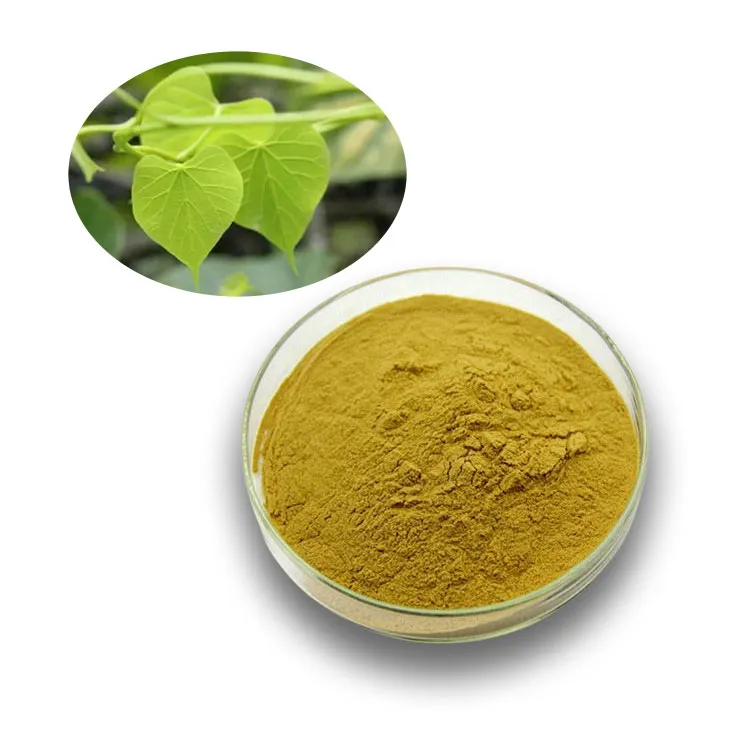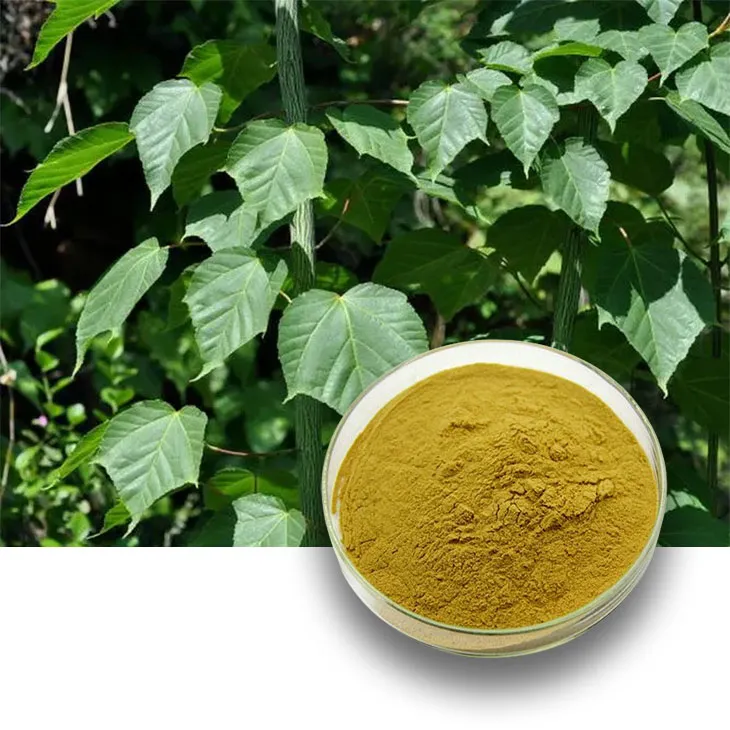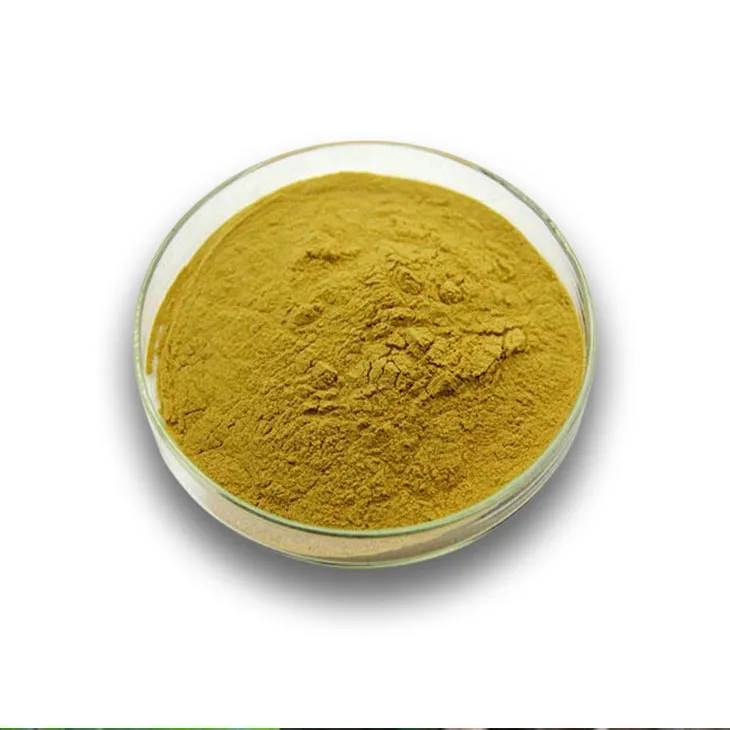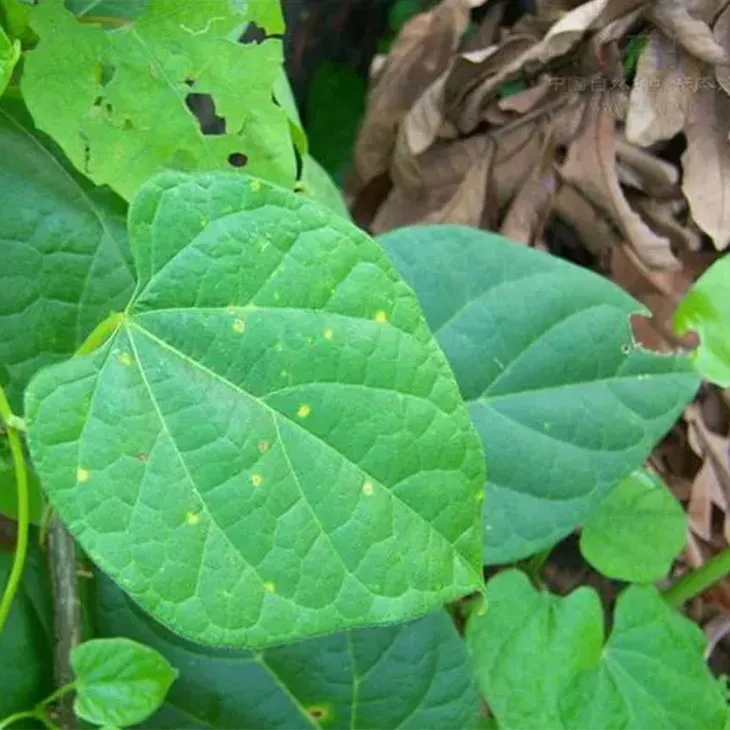- 0086-571-85302990
- sales@greenskybio.com
What is Tinospora cordifolia extract? Definition, types, history and nutritional value.
2024-12-21

1. Definition
Tinospora cordifolia extract is a substance obtained from the Tinospora cordifolia plant. This plant, also known as Heart - leaved Tinospora, is a vine that is native to tropical regions, especially in Asia. The extract is made through various extraction processes, which are designed to isolate and concentrate the beneficial components present in the plant. These processes can involve the use of solvents such as ethanol or water to draw out the desired substances from the plant material.

2. Types
There are primarily two main types of Tinospora cordifolia extract:
2.1 Crude Extract
The crude extract is a more basic form of the extract. It contains a wide array of natural components that are present in the Tinospora cordifolia plant. This includes not only the potentially active ingredients but also other substances such as carbohydrates, proteins, and lipids in smaller amounts. The crude extract is like a "package deal" that holds all the substances that are initially extracted from the plant. It has a more complex composition and can be used as a starting material for further refinement or can be studied in its natural state to understand the overall effects of the plant's components.
2.2 Refined Extract
In contrast, the refined extract is a more processed form. It may be concentrated with specific active ingredients. Through various purification and separation techniques, the desired components are isolated and concentrated. For example, if a particular alkaloid or antioxidant in Tinospora cordifolia is known to have a specific health - promoting effect, the refined extract can be created to have a higher concentration of that substance. This makes the refined extract more targeted in its potential applications, as it can be formulated for specific therapeutic or health - related purposes.

3. History
The use of Tinospora cordifolia in traditional medicine dates back many centuries.
3.1 In Asian Traditional Medicine
In Asia, especially in countries like India, the plant has been an integral part of traditional medicine systems such as Ayurveda. Ayurvedic practitioners have used Tinospora cordifolia for a variety of ailments. It has been prescribed for treating fevers, as it was believed to have antipyretic properties. Additionally, it was used for digestive disorders, as it was thought to stimulate the digestive system and improve appetite. The plant was also used in the treatment of skin diseases, where topical applications of preparations containing Tinospora cordifolia were made.
3.2 Historical Documentation
There are ancient texts in Ayurveda that document the use of Tinospora cordifolia. These texts describe the plant's properties, methods of preparation, and the conditions it was used to treat. Over time, the knowledge of the plant's uses has been passed down through generations of practitioners. As the understanding of medicine has evolved, modern research has also started to take an interest in this traditional plant, exploring its potential based on the historical knowledge and the need to find new sources of natural remedies.

4. Nutritional Value
The Tinospora cordifolia extract offers a wealth of bioactive substances that contribute to its nutritional value.
4.1 Bioactive Compounds
One of the important groups of bioactive compounds in Tinospora cordifolia are alkaloids. These alkaloids have been studied for their potential pharmacological effects. For example, some alkaloids may have antioxidant properties, which can help in protecting the body's cells from oxidative damage caused by free radicals. Free radicals are unstable molecules that can damage cells and are associated with various diseases and the aging process.
Another group of bioactive substances are the polyphenols. Tinospora cordifolia contains polyphenols such as flavonoids. Flavonoids are known for their antioxidant, anti - inflammatory, and anti - microbial activities. They can help in reducing inflammation in the body, which is beneficial for conditions like arthritis and other inflammatory disorders. The anti - microbial activity of flavonoids can also play a role in protecting the body from infections by inhibiting the growth of harmful microorganisms.
4.2 Health - Promoting Effects
Digestive Health
- The extract can support better digestion. The bioactive substances present in it can stimulate the secretion of digestive enzymes. For example, it may enhance the production of enzymes like amylase, which helps in the breakdown of carbohydrates, and lipase, which is involved in the digestion of fats. This can lead to more efficient digestion and absorption of nutrients from the food we eat.
- It can also help in maintaining a healthy gut microbiota. A balanced gut microbiota is essential for overall health, as it is involved in various functions such as digestion, immune function, and even mental health. The bioactive compounds in Tinospora cordifolia extract may act as prebiotics, which are substances that promote the growth of beneficial bacteria in the gut.
Immune System Support
- The various bioactive components in the extract can play a role in supporting the proper functioning of the immune system. For instance, the antioxidants present can help in reducing oxidative stress on immune cells. Oxidative stress can weaken the immune system, and by reducing it, the immune cells can function more effectively.
- Some of the alkaloids and other bioactive substances may have immunomodulatory effects. This means that they can regulate the immune response, ensuring that it is neither overactive (which can lead to autoimmune disorders) nor underactive (which can make the body more susceptible to infections).
Other Potential Health Benefits
- There is some evidence to suggest that Tinospora cordifolia extract may have anti - diabetic properties. It may help in regulating blood sugar levels, perhaps by improving insulin sensitivity or by affecting the metabolism of glucose in the body. However, more research is needed to fully understand this aspect.
- In terms of cardiovascular health, the antioxidant and anti - inflammatory properties of the extract may contribute to reducing the risk of heart disease. It may help in lowering blood pressure, reducing cholesterol levels, and preventing the formation of blood clots.

FAQ:
What is the main source of Tinospora cordifolia extract?
The main source of Tinospora cordifolia extract is the Tinospora cordifolia plant itself. This plant is used to produce the extract through various extraction methods.
How is the crude Tinospora cordifolia extract different from the refined one?
The crude Tinospora cordifolia extract contains a broader range of natural components. In contrast, the refined extract is often concentrated with specific active ingredients, which means it has a higher concentration of certain substances that are considered to have particular health - promoting effects.
What are the traditional uses of Tinospora cordifolia in Asian medicine?
In Asian traditional medicine, Tinospora cordifolia has been used for a long time. It has been used to potentially promote health in various ways, such as for treating certain ailments, enhancing the body's resistance, and improving overall well - being, although specific uses can vary among different traditional medicine systems.
How does Tinospora cordifolia extract support the immune system?
Tinospora cordifolia extract contains bioactive substances. These substances can interact with the body's physiological processes related to the immune system. For example, they may stimulate the production of immune cells or enhance the function of the immune system's defense mechanisms, but the exact mechanisms are still being studied.
Can Tinospora cordifolia extract improve digestion?
Yes, it can. Tinospora cordifolia extract offers bioactive substances that can interact with the body's digestive processes. It may help in improving the function of the digestive organs, promoting the secretion of digestive enzymes, or enhancing the absorption of nutrients, thus contributing to better digestion.
Related literature
- Tinospora cordifolia: A Review of Its Phytochemistry, Pharmacology, and Therapeutic Applications"
- "Bioactive Compounds in Tinospora cordifolia: Implications for Health and Wellness"
- "Traditional and Modern Perspectives on Tinospora cordifolia"
- ▶ Hesperidin
- ▶ citrus bioflavonoids
- ▶ plant extract
- ▶ lycopene
- ▶ Diosmin
- ▶ Grape seed extract
- ▶ Sea buckthorn Juice Powder
- ▶ Beetroot powder
- ▶ Hops Extract
- ▶ Artichoke Extract
- ▶ Reishi mushroom extract
- ▶ Astaxanthin
- ▶ Green Tea Extract
- ▶ Curcumin Extract
- ▶ Horse Chestnut Extract
- ▶ Other Problems
- ▶ Boswellia Serrata Extract
- ▶ Resveratrol Extract
- ▶ Marigold Extract
- ▶ Grape Leaf Extract
- ▶ blog3
- ▶ blog4
- ▶ blog5
-
Pure 85% Tomentil Extract.
2024-12-21
-
Quercetin
2024-12-21
-
Black Rice Extract
2024-12-21
-
Maitake Mushroom Extract
2024-12-21
-
Bitter Melon Extract
2024-12-21
-
Stevia Extract
2024-12-21
-
Agaricus Blazei Extract
2024-12-21
-
Europen Bilberry Extract
2024-12-21
-
Hawthorn powder
2024-12-21
-
White Peony Extract
2024-12-21
-
Gynostemma pentaphyllum extract
2024-12-21





















